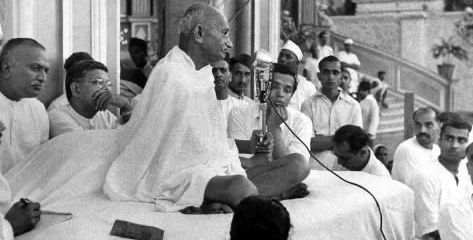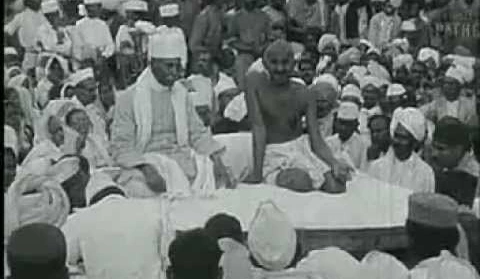Mahatma Gandhi — The Power of Peace That Shook an Empire
In a world where freedom was often won by force, he chose the path of peace.Mahatma Gandhi proved that nonviolence can be mightier than the sword, and truth stronger than empire.
Born in 1869 in India, Gandhi was raised with deep spiritual values. After studying law in London, he moved to South Africa, where he experienced institutional racism. There, he developed his philosophy of Satyagraha — "truth-force," or peaceful resistance.
Returning to India in 1915, he became the heart of the movement for independence from British rule — not through war, but through non-cooperation, boycotts, civil disobedience, and unwavering moral resolve.
“Be the change you wish to see in the world,” he famously said.
One of his most iconic acts was the Salt March of 1930, where Gandhi and his followers walked over 240 miles to the sea to protest Britain’s salt monopoly. It was a protest with no weapons — only courage, unity, and principle.
Gandhi was not without flaws, but he never strayed from his core belief: freedom must be born from peace, not hatred.
His influence reached far beyond India. Leaders like Martin Luther King Jr. and Nelson Mandela drew strength from his example.
On January 30, 1948, Gandhi was assassinated — but his ideals remain alive across the globe.


Gandhi's journey was not marked by conquest, but by conscience. He stood not on battlefields, but on principles — and in doing so, he changed the course of history. More than a political figure, Mohandas Karamchand Gandhi was a moral revolutionary whose weapon was the human spirit.
His life was a testament to patience and conviction. Dressed in simple cloth and walking barefoot, Gandhi embodied the very values he preached — humility, service, and equality. For him, true strength came not from domination, but from the ability to suffer for a just cause without retaliation.
Throughout his lifetime, Gandhi endured countless arrests, hunger strikes, and public criticism. Yet he remained steadfast. Each time he was imprisoned, his resolve only grew stronger. He turned personal sacrifice into collective empowerment — showing millions that the chains of oppression could be broken not with bullets, but with belief.
He championed the rights of the "untouchables," whom he renamed Harijans, or “children of God.” He advocated for women’s rights, self-sufficiency, and interfaith harmony, believing that freedom must include all — or it includes none. To Gandhi, independence was not only political but spiritual. It required a transformation of the self as well as society.
Gandhi’s spinning wheel, or charkha, became a symbol of self-reliance and resistance. By encouraging Indians to spin their own cloth instead of buying British textiles, he turned an everyday act into a national movement. His call to “swadeshi” — the use of homegrown goods — was a radical act of reclaiming identity from the grip of colonial rule.
But perhaps what set Gandhi apart most was his unwavering belief in the power of dialogue. He met with his fiercest opponents not to destroy them, but to understand them. Even in the face of violence and hatred, he held fast to nonviolence as a path not of weakness, but of unimaginable courage.
The twilight of his life was shadowed by the partition of India in 1947 — a tragedy that tore the subcontinent into two nations and left lasting scars. Gandhi mourned the bloodshed and worked tirelessly to calm communal violence. While others celebrated independence, he fasted to protest Hindu-Muslim conflict, refusing to rejoice while his people suffered.
His assassination in 1948 was a tragic end to a life dedicated to peace — but it did not silence his message. Instead, it echoed louder across generations. Gandhi’s philosophy would inspire movements for civil rights, human dignity, and justice around the world.
In the decades that followed, his teachings shaped global figures and grassroots movements alike. Martin Luther King Jr. drew upon Gandhi’s strategies during the American civil rights movement. Nelson Mandela found strength in his philosophy during South Africa’s struggle against apartheid. Even today, peaceful protests around the globe — from climate marches to democracy movements — carry Gandhi’s spirit forward.
Gandhi once said, “The day the power of love overrules the love of power, the world will know peace.” Those words remain a compass for those still seeking justice without violence.
His legacy is not just etched into history books or carved into statues. It lives on in every act of kindness, every voice raised for truth, and every step taken toward equality. Gandhi showed us that peace is not passive — it is an active, radical force capable of changing even the most entrenched systems.
To remember Gandhi is to remember that the greatest revolutions begin not with weapons, but with the courage to stand firm in peace — no matter the cost.
Close